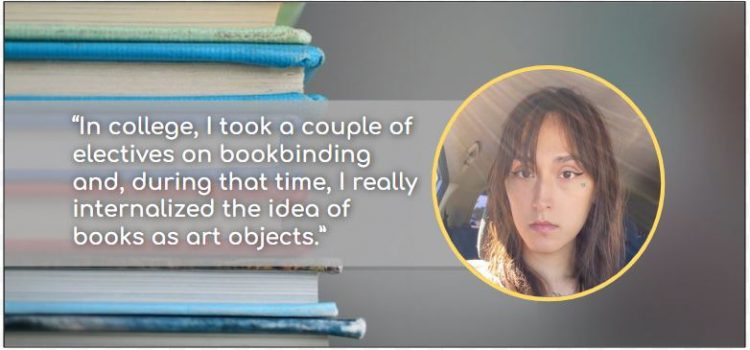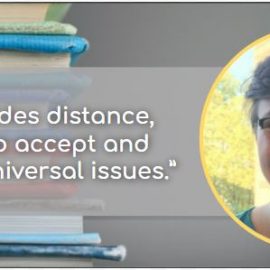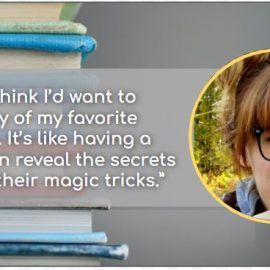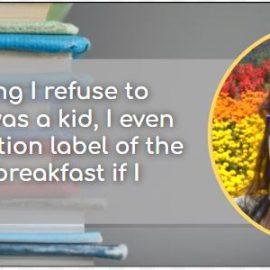
Why does Violet think people are fascinated by horror? What book genre is she wary of?
Violet is a Shortform book guide writer from Nebraska. She loves an impactful short story and an occasional YA novel.
Our Interview With Violet
Recently, we interviewed one of our writers, Violet, about her relationship with books and her reading tastes. Here’s what she had to say.
What’s your favorite book and why?
My favorite book is probably Salvage the Bones by Jesmyn Ward. As a novel, it’s pretty limited in scope. It follows a young girl, Esch, and her siblings in the days before a hurricane. I don’t know what else to say about it, but it’s a beautiful, achingly tender book that does not pull any of its punches.
Honorable mentions: Exit West by Mohsin Hamid, One Hundred Years of Solitude by Gabriel Garcia Marquez, and What About the Rest of Your Life? by Sung Yim.
What’s on your reading list these days?
I recently finished reading Junji Ito’s Uzumaki end-to-end. It’s a fantastic episodic horror manga about a series of spooky events in a small Japanese town. Graphic novels and manga can be great, fun breaks from denser topics.
Up next is Stories of Your Life and Others by Ted Chiang. Chiang’s work sits in a sweet spot between literary and genre fiction that’s really fun to read. I’m excited to dig deeper into his work, especially because one of the stories in the book is apparently the source material for one of my all-time favorite movies, 2016’s Arrival.
If you could have a dinner party with any three authors—dead or alive—who would they be and why?
This is a tricky one. I’m a little afraid of meeting my idols. Like, what if I meet Gabriel Garcia Marquez and, in person, he’s a bore? I’m just going to pick three people I think would be fun to party with. To that end, we’ll go with Philip K. Dick, Tennessee Williams, and Dennis Cooper. Honorable mention to Baudelaire.
What’s your favorite genre? Why does it intrigue you?
Outside of books, I consume a lot of horror movies! I have a bunch of pet theories about why human beings think it’s fun to consume something that scares them. Even more than that, though, I think monsters are interesting in a literary sense.
Take a movie like The Fly, where Jeff Goldblum’s character slowly morphs into a horrifying human-fly hybrid. At some point, his humanity is so diminished that he crosses over the line into monsterdom. One of the most interesting questions that horror asks us is this: Where exactly is that line? Where should it be? And, who does our society put on the other side of it?
Are there any book genres or tropes that you dislike or refuse to read?
I’ve always been wary of self-help titles. I think I might just be biased, but something about self-improvement as an industry seems suspect to me. And I’m certainly not here to knock anything that works for anybody else! But, I think for advice books to be widely marketable, they have to be really generalized. And I think this results in weaker books coming across as being more-or-less repackaged common sense.
What’s your favorite way to read a book?
I’m a sucker for old-school physical books. In college, I took a couple of electives on bookbinding and, during that time, I really internalized the idea of books as art objects. Book design is an important and often overlooked part of the publishing process, and I always appreciate when I can tell that love and care went into presenting a book to the world. It’s a bit like plating food or framing paintings. Is it absolutely necessary? No, of course not. But beautiful physical designs can really improve a reader’s experience, and the best designs speak artistically to a book’s contents.
What book do you think everyone should read in their lifetime?
This is maybe a cop-out, but, I think what’s really important is that you read any books at all! Not to be morose about it, but you get only so much time on Earth. If there’s something you’ve been wanting to read but you’ve been putting off, now’s the time.
If I had to suggest one thing, it’d be Ted Chiang’s short story The Great Silence. It’s good for us all to feel cosmically small sometimes.
Who are your favorite authors?
I’m a big fan of George Saunders’s short fiction. I think his stuff does a great job capturing the alienation of modern life without being defeatist about it. He puts his characters through a lot, but in a really loving way, where their little moments of mundane courage and humanity really get to shine.
Torrey Peters is another one of my favorite writers, and it’s been exciting to see her work reach a level of readership and acclaim that it has always deserved. A lot of people have read Detransition, Baby, but her earlier novella, Infect Your Friends and Loved Ones, is a remarkably quick and powerful read. I think it’s being republished later this year, along with some of her other work.
How have your reading tastes changed over the years?
As a kid, I was a ravenous fiction reader, reading primarily novels. I majored in English in college and also read lots of novels in short periods of time and sort of burned myself out. Now, I’m much more inclined toward digestible chunks. I love reading short stories and poetry collections. Being able to sit for 20 minutes at a time and still get so much out of what I’m reading is nice.
Was there a specific book that sparked your love of reading? How so?
I remember reading The Hobbit in middle school and being so lost in Mirkwood that I didn’t notice the rest of the class had already gone out for recess! I read a lot of fantasy as a kid, and I think it left a big mark on me. I’m a Tolkien nerd for life.
Do you have any guilty pleasure books?
A really good dystopian YA novel with fast pacing and cool characters still scratches a very specific itch from time to time. It’s reassuring to read stories where good people triumph dramatically over oppressive forces in about 180 pages. Real life—and fiction about real life—is usually much more complicated, with ethical grey areas and pyrrhic victories, at best. It’s nice when the good guys win, and it’s even nicer when you know who the “good guys” are in the first place.
What’s an interesting fact that you learned from a book recently?
In Bad Science by Ben Goldacre, he lists some pretty interesting facts about the placebo effect. For instance, did you know that the color of placebo pills affects the relative strength of the placebo effect? Pink and red pills make more effective placebo stimulants, while blue pills work better as placebo sedatives.
Have any books you’ve read caused you to make any life changes or develop any habits?
A book I read when I was first getting into poetry, Spencer Madsen’s You Can Make Anything Sad, had a pretty profound effect on how I related to people at the time. A lot of the book is about dealing with failure and recognizing that everyone around you is constantly failing, too. There’s a line that goes, “Understanding that people are always a worse version of who they want to be is a way of loving them.” It’s maybe a bit saccharine for my tastes now but, still, I think the idea stands up. Everyone is struggling to be better, whether or not you see it. Be nice!
What’s your favorite quote from a book or an author?
Going back to being a J. R. R. Tolkien nerd. This, from The Fellowship of the Ring, needs no introduction or explanation:
“I wish it need not have happened in my time,” said Frodo. “So do I,” said Gandalf, “and so do all who live to see such times. But that is not for them to decide. All we have to decide is what to do with the time that is given us.”
What are your favorite book adaptations and why?
The Peter Jackson Lord of the Rings movies are the standard by which all other movie adaptations should be measured. They aren’t completely faithful to the book in terms of plot, as they had to leave a lot out by the nature of the medium. However, they’re very thematically faithful to Tolkien’s works. All his big ideas, his beliefs about people and their capacity for goodness, sing.
Honorable mention: They’re comic book adaptations, but the Guillermo del Toro Hellboy movies rock.
Are there any lesser-known books that you’ve read that you want others to know exist?
What About the Rest of Your Life? by Sung Yim is a book that I recommend to a lot of people. In many ways, it’s a classic coming-of-age memoir, but it’s written frankly and with so much charm that you can’t help but root for the narrator. Sung Yim is a literary light, and I can’t recommend their work enough.
At Shortform, how do you go about working on a book that has viewpoints you don’t agree with?
Honestly, I just try to remember that my opinion is one among many and not a very useful metric for pretty much anything. Keep an open mind, and all that.
Violet’s Recommended Reading List
- Salvage the Bones by Jesmyn Ward
- What About the Rest of Your Life? by Sung Yim
- Exit West by Mohsin Hamid
- One Hundred Years of Solitude by Gabriel Garcia Marquez
- The Great Silence by Ted Chiang
About the Series
At Shortform, we want to give our employees names and faces so you can get to know the people who make the magic happen. That’s why we’re doing the Shortform Reads series, where we interview our employees and share their thoughts and opinions. You can check out more employee interviews here.







I LOOOOOOOOOOOOOOOOOOOOOOOOOOOOOOOVE YOU HANNAH ASTER!!!!!!!!!!!!!!!!!!!!!!!!!!!!!!!!!!!!!!!!!!!!!!!!!!!!!!!!!!!!!!!!!!!!!!!!!!😍😍😍😆😆😆😆🎅🏿🤶🏿